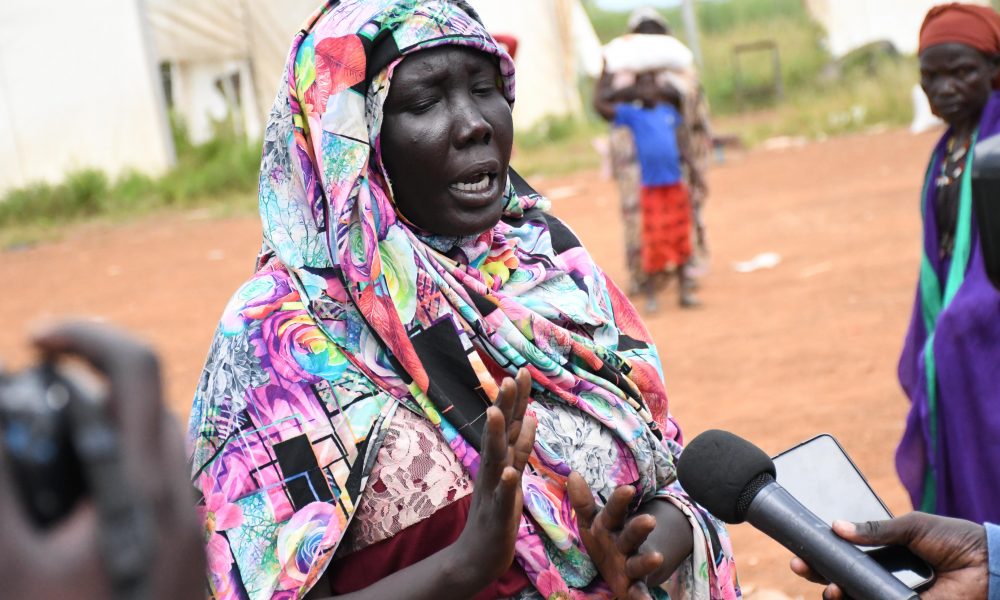By Mamer Abraham
About 105,000 returnees who fled Sudan war to Northern Bahr El Ghazal State are going for months without receiving any food assistance.
Congested at food distribution center gate in Aweil West County, the hungry returnees on Thursday questioned the criterion of selecting beneficiaries of food aid.
“Why are some returnees granted food while others like us are denied, yet we are all same category of suffering people?” angry returnees questioned intermittently amidst chorus of noises.
The state government had decided not to create a camp for the returnees but allows them to integrate, so that they get needed support from the host community.
Abuk Kom, 38-year-old mother of four children, is one of the several returnees striving to survive hardship in her homeland after decades in Sudan.
Abuk, who confirmed that she lived with her relatives, said lack of food assistance had forced her to brew local wine to earn a living, where she makes about 3,000 SSP per day to feed her children.
“I have been here for three months without receiving food since I came. I only received soap and a bucket, but no food,” Abuk complained.
Guot Guot Ayiei, another returnee, who now sells charcoal-selling to earn a living, equally lamented the ordeals in the new environment.
“We have a lot of problems; we came in the morning with the cards we received. We did not bring these cards from any other places. They were written by Renk. These should be examined; are we the ones who wrote them or did the organization write them?” Guot said.
Guot said he had not received anything for three months and had been selling charcoal or groundnuts so that he could put food on the table for his children.
“When things became hard, I started hustling by selling charcoal and sometimes getting groundnuts to sell. Sometimes, if I get a tin, I will give it to my children,” he continued.
Guot said that he would return to Sudan with his children if he spent two or three more days without receiving any humanitarian assistance.
“We came here from Khartoum not to die. Now some people have received while others have not. Now if I spend 2 to 3 days more, I might take my children, even if they go and die. What shall I do again?” he added.
Lony Dumo, 37, a mother of six children, said she would not return her children to Sudan because, while in Sudan, they were like prisoners, but now they are free and need to pray to God to grant South Sudan sustainable peace.
Christina Ajong Garang, who received it, urged the RRC to consider that the people who had not been receiving food should be granted their rights because they are also taking care of children, which is the reason that made them escape Sudan.
However, according to the deputy chairperson of the Relief and Rehabilitation Commission (RRC) in Northern Bahr El Ghazal State, Angelo Deng Akol, most of the returnees were not given ration cards at the border and were still holding the cards they used in Sudan, which are not acceptable in South Sudan.
Akol said the total number of returnees in Northern Bahr El Ghazal State was 121,000 individuals, while only 16,000 individuals in Northern Bahr El Ghazal State were eligible to receive food assistance.
He described their assistance as dire and urged the concerned humanitarian organizations across the state to intervene by conducting verification so that those who do not receive food would be assisted.
Deng disclosed that the returnees who could not receive food were carrying cards from Sudan, which proved them to be returnees, but they unfortunately entered the country without being issued cards by IOM.
“And those people, we have been asking all the humanitarian actors in Northern Bahr el Ghazal so that verification can be done, and their figure can be added to the figure that was tracked by IOM, and assistance will follow,” he explained.
He stated that the resources had been stretched within the host community because the returnees were living together with the host community and had been offering them all the support they deserved.
Deng said the burden of returnees to the host community, required immediate response.




